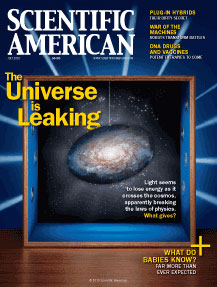How weird beliefs can land you in jail
When I was in college, my friend and I attended a tax seminar in which we were told that paying taxes was unnecessary because the Sixteenth Amendment—empowering Congress to levy an income tax—was never legally ratified. After a long and detailed history of the IRS, we were advised not to file a tax return and given instructions on what to do and say when the feds come a-knockin’. The slick presentation seemed internally coherent and logically plausible in the room, but later, after some reflection, I figured it couldn’t possibly be true because no one would pay taxes if it were. In contrast, my friend went for it and got away tax-free for years, until the IRS caught up with him and he got his comeuppance.
I was thinking about this incident in August, when I appeared as an expert witness on the psychology of why people fall for such schemes in a Portland, Ore., court in the case of USA v. Miles J. Julison, a house flipper who neared financial ruin after the housing-market meltdown. That year he reported $583,151 in “other income” to the IRS on his tax return, claiming that the entire amount was withheld as income taxes. Submitting eight IRS 1099–OID (Original Issue Discount) forms, Julison requested a refund of $411,773. (According to the IRS, an “OID is a form of interest. It is the excess of a debt instrument’s stated redemption price at maturity over its issue price.”) The IRS sent him a check in that amount, which he spent on a home loan, personal debts, a car and a boat. Emboldened by his success, the next year he demanded a refund of more than $1.5 million. This time, however, instead of a refund check he got a trip to court and, after a guilty verdict, jail. (continue reading…)
read or write comments (34)
Cautionary Tales from the Front Lines of Science
A review of On Fact and Fraud: Cautionary Tales from the Front Lines of Science by David Goodstein. This review appeared in the American Journal of Physics on July 14, 2010.
In 1609 Galileo turned toward the heavens a modified version of the telescope first invented by the Dutch spectaclemaker Hans Lippershey, and there he observed that satellites were orbiting Jupiter, that Venus had phases, and that there were mountains on the moon and spots on the sun. His claims challenged Aristotelian cosmology, which held that all objects in space must be perfectly round and perfectly smooth. After observing Saturn, however, Galileo wrote to Johannes Kepler, “Altissimum planetam tergeminum observavi” (“I have observed that the farthest planet is threefold”). He continued: “This is to say that to my very great amazement Saturn was seen to me to be not a single star, but three together, which almost touch each other.” Galileo saw Saturn not as a planet with rings as we see it today in even the tiniest of home telescopes, but as one large sphere surrounded by two smaller spheres.
Why did Galileo make this mistake? Two reasons: (1) Data—Saturn is twice as far away as Jupiter; thus what few photons of light there were streaming through the cloudy glass in his little tube made resolution of the rings problematic at best; and (2) theory—there was no theory of planetary rings. It is at this intersection of nonexistent theory and nebulous data that the power of belief is at its zenith and the mind fills in the blanks. (continue reading…)
Comments Off on On Fact and Fraud
Fraud, deception and lies in research reveal
how science is (mostly) self-correcting
In his 1974 commencement speech at the California Institute of Technology, Nobel laureate physicist Richard P. Feynman articulated the foundation of scientific integrity: “The first principle is that you must not fool yourself — and you are the easiest person to fool… After you’ve not fooled yourself, it’s easy not to fool other scientists. You just have to be honest in a conventional way after that.”
Unfortunately, says Feynman’s Caltech colleague David Goodstein in his new book On Fact and Fraud: Cautionary Takes from the Front Lines of Science, some scientists do try to fool their colleagues, and believing that everyone is conventionally honest may make a person more likely to be duped by deliberate fraud. Nature may be subtle, but she does not intentionally lie. People do. Why some scientists lie is what Goodstein wants to understand. He begins by debunking myths about science such as: (continue reading…)
read or write comments (14)



